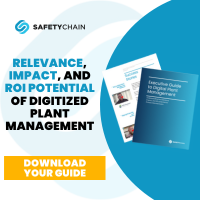In many areas of the U.S., businesses are reopening and companies are finding ways to adjust to new operational norms in this second phase of COVID-19. For food and beverage companies, there are many complexities to consider. While many things within
manufacturing companies are changing, priorities such as safety and quality remain as important as ever.
To balance these priorities while adjusting to the evolving expectations of customers and employees, many companies are embracing remote operations. Although there are aspects of manufacturing which can’t be conducted offsite, with the right technology, a significant portion of business can be taken out of the facility. With this approach, companies can minimize the number of people entering and exiting the plant to control risks, keep employees satisfied, and respond to customer demands through new, automated solutions.
Remote Operations: The Need for Automation
The key to remote operations is automation. Today, technology is available that provides real-time visibility into plant operations through automated data collection and analytics tools. There are vast opportunities to streamline activities and provide supervision by leveraging these tools to gather critical metrics in real-time. To find out where these opportunities lie, begin looking at your core business activities. Everything from sales and procurement to quality, maintenance, and production will have data collection steps that can be automated.
To further pinpoint which activities are ideal for automation, consider where the data comes from. Is it automatically gathered from machines, or does someone need to manually record it, write it on paper, and pass that paperwork throughout the facility? In either scenario, there are opportunities to digitally capture that information and make it accessible to supervisors or other key parties wherever they are. Supervisors can then effectively fulfill their roles from home.
Going Beyond Safety & Convenience: OEE
While remote operations may be born out of necessity, it can actually help your company not just meet the demands of this new normal, but actually grow and improve. With
overall equipment effectiveness (OEE) software, supervisors can better monitor production in real-time with data that sheds light into areas of potential improvement across lines, shifts, machines, and processes. OEE, therefore, enables you to pursue the long-term goal of becoming more efficient, which will also translate to better overall financial health for your company.
Benefits of Automation
Aside from becoming more efficient and enabling work-from-home arrangements, automation has some additional benefits for food and beverage companies. For one, it can help you meet evolving customer expectations. Consumers are making purchases online now more than ever before. With features such as automated order tracking, you can offer a better customer experience. Similarly, providing your customer service staff with automated solutions grants them access to the data they need to give prompt answers and support, which can further enhance customer satisfaction.
Moreover, automation could even help your company save jobs. COVID-19 has had a significant financial impact on many organizations, but plants that embrace automation can enable the workforce to do more, since time-consuming tasks like manual data entry are no longer necessary.
Both the short-term benefits and long-term potential of remote work are clear for food and beverage companies. In fact, it’s likely that remote work will not just become a practical solution, but actually a necessity for thriving beyond COVID. If you’re seeking solutions to simplify remote work in your facility, learn more about our
OEE and production software.
For More Information
